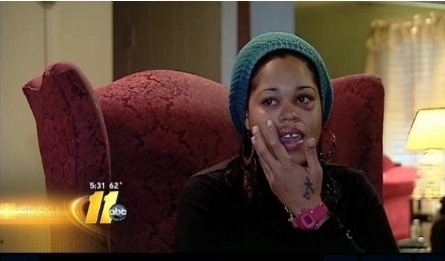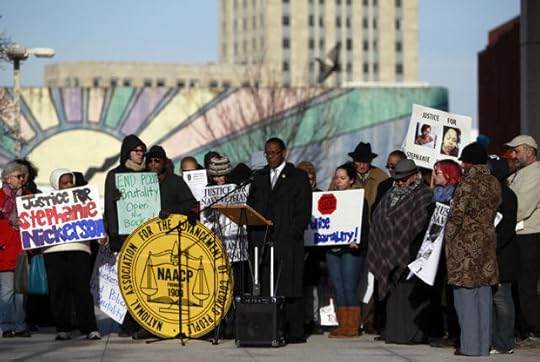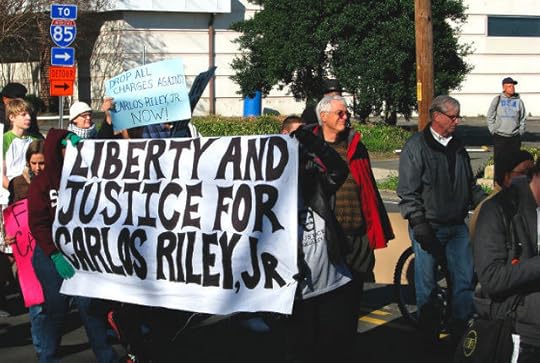Mark Anthony Neal's Blog, page 877
August 7, 2013
'A Dream Foreclosed': New Book Reveals Racist Roots of Housing Crisis
Democracy Now
As President Obama heads to Phoenix today to tout the "housing recovery," journalist Laura Gottesdiener examines the devastating legacy of the foreclosure crisis and how much of the so-called recovery is a result of large private equity firms buying up hundreds of thousands of foreclosed homes. More than 10 million people across the country have been evicted from their homes in the last six years. Her new book, "A Dream Foreclosed: Black America and the Fight for a Place to Call Home," focuses on four families who have pushed back against foreclosures. "The banks exploited a larger historical trajectory of discrimination in lending and in housing that has existed since the beginning of this country. The banks intentionally went into communities that had been redlined, which meant that the federal housing administration had made it a policy to not lend and not to guarantee any loans in minority neighborhoods all throughout most of the 20th century that didn't supposedly end until well into the 1960s," Gottesdiener says. "And they exploited that historical reality and pushed the worst of the worst loans in these communities that everyone knew were unpayable debts -- that Wall Street knew."
Published on August 07, 2013 07:01
August 5, 2013
Cooking for Paula Deen: Dora Charles Talks to the 'New York Times' (video)
The New York Times
Dora Charles worked for Paula Deen for more than 20 years. She alleges she endured a history of racism and unfair compensation despite their close relationship.
Published on August 05, 2013 20:21
Dream Defenders Take Over Florida For Trayvon Martin (Episode Two)
Global Grind TV | Dream Defenders
The Dream Defenders, a group of student activists in Florida, aren't deterred by Gov. Rick Scott's refusal to hold a special session on the Stand Your Ground Law that allows individuals like George Zimmerman to claim self-defense. Instead, they are taking their cause - and Trayvon Martin's memory - straight to the lawmakers themselves. Watch as they stand their own ground to repeal the controversial protection law that begets violence.
Published on August 05, 2013 20:08
Alice Smith Sings and Talks on NPR's Tell Me More with Michel Martin
Published on August 05, 2013 17:20
Who’s Policing the Police?: A North Carolina Perspective by Lamont Lilly
 Who’s Policing the Police?
: A North Carolina Perspective by Lamont Lilly | Durham News special to NewBlackMan (in Exile)
Who’s Policing the Police?
: A North Carolina Perspective by Lamont Lilly | Durham News special to NewBlackMan (in Exile)According to a recent report entitled “End Racial Profiling in Durham Now,” attorney Scott Holmes says black suspects are nine times more likely than white suspects to be incarcerated for criminal conduct in Durham County. Black motorists in Durham are more than 200 percent more likely to be searched by law enforcement in routine traffic stops – the highest racial disparity among any of North Carolina’s 100 counties.
Shortly after Holmes’ report was released, local student and Navy veteran, Stephanie Nickerson was brutally beaten by Durham police officer Brian Schnee. Nickerson, who suffered a broken nose, black eye and two busted lips, was charged with assaulting an officer and resisting arrest. In the midst of community protests and just before a hearing, Officer Schnee resigned and was never charged with a single crime. While Nickerson’s online photographs spoke volumes, city officials remained silent until police acknowledged Schnee had used “more force than was necessary.”

Two months later on Dec. 18, 2012, Durham resident Carlos Riley Jr. was dropping off his girlfriend around 10 a.m. when he stopped to speak with an acquaintance. Shortly after, police officer Kelly A. Stewart pulled behind him driving an unmarked police vehicle, wearing plain clothing. As Riley drove off, Stewart followed, turned his lights on and pulled him over. Riley’s defense points to racial profiling when Stewart approached the vehicle, accusing Carlos of smoking marijuana. There was none.
Minutes later, Carlos Jr. had somehow received lacerations under one of his eyes and along his jaw line. A struggle ensued. Riley supporters say Stewart then fired his weapon, shooting himself in the right leg. Now months later, 21-year old Carlos Riley Jr. has remained incarcerated on charges of assaulting a law enforcement officer and possession of a firearm. The Durham Police Department has yet to release a valid report or formal statement. Neighborhood witnesses have also reported intimidation by local detectives.
Bull City Background
In 1997, Durham residents, Margaret Dukes and Reta Scarlett were awarded $295,000 in a settlement with the city. Their experience with the Durham Police Department’s bold brand of brutality was undeniable. In the same year, Kimberly Porter was awarded up to $29,500 in damage and fees on the same claim.
In 1994, Reginald Craig suffered a ghastly beating by two Durham police officers with a metal flashlight during a routine traffic stop. Though the officers were found not guilty, Craig’s public complaint offered early insight to a budding culture of police misconduct and excessive force. Five years later, Charles Wright, a Durham municipal worker, filed a lawsuit against the Durham Police Department on charges of “excessive force without reason.”
As Mark Schultz reported in March, Durham police officers violated the department’s use-of-force policy five times in 2012 (DN, March 18, bit.ly/1aWPiim). In January of this year, three Durham police officers were arrested for breaking and entering, assault and false imprisonment. I won’t even mention Durham police sergeant, Lester Rhodes’ 2011 kidnapping and sexual assault charges.

There are long-standing issues in the Durham Police Department, which apparently have not subsided. When regular citizens commit heinous crimes, they serve time. When Durham police officers beat residents and misbehave, they conveniently “resign.” Riley and Nickerson are just two of the recent cases. Sounds like attorney Scott Holmes is on to something here. What if racial profiling really does exist in Durham? What if brutality and excessive force became common practice?
***
Durham activist Lamont Lilly is a contributing editor with the Triangle Free Press, Human Rights Delegate with Witness for Peace and organizer with Workers World Party.
Published on August 05, 2013 08:24
August 4, 2013
“Feds Watching”: The Micro-politics of Blackness in the Age of Surveillance by Mark Anthony Neal
 “Feds Watching”: The Micro-politics of Blackness in the Age of Surveillance
by Mark Anthony Neal | NewBlackMan (in Exile)
“Feds Watching”: The Micro-politics of Blackness in the Age of Surveillance
by Mark Anthony Neal | NewBlackMan (in Exile)Twenty-five years ago, the strident political commentary of artists like Public Enemy, KRS-One, Poor Righteous Teachers and (even) N.W.A.—rendered as sub-cultural, underground interventions—served as forms of micro-politics, that politicized a generation of Black youth. We’d all be lying if we thought that such interventions were possible in the mainstream of American entertainment in 2013—or more importantly, if we would be comfortable it were.
Subversion on the level of micro-politics—what James C. Scott has called “hidden transcripts” in one iteration and Robin D.G. Kelley has called “informal infrapolitics” in another—was never intended to be broadcast writ large for mass consumption; something apropos to the slave holders and overseers translating field hollers. It only makes sense, now that every corporation in the world is literally in the room—from McDonald’s to Samsung—that rap music would contain very little of the content that some deem necessary for liberation (a term that has been amorphous enough, since that first generation walked off–and some walked back on to—those plantations).
Yet the genius of Blackness—even in the guise of so-called “commercial” rap music—is that the micro-politics always remain, wedded to a subversion of the moment, that is as unsustainable as it may be undecipherable—hence its value to the moment.
Enter exhibit A: the music video for “Feds Watching,” 2 Chainz’s new collaboration with Pharrell Williams (directed by Ryan Hope), that reads as some two decade’s old mash of Miami Vice and The Wire—a nostalgic kiss to an era when Mafioso fantasies served as master narratives to mid-1990s artists consumed with controlling their own financial and artistic fates, within corporate entities with little interests in either (let alone Black liberation).
The silhouetted Black woman who appears in the video’s opening sequence and who remains on the periphery of the action throughout, is a subtle reminder that sometimes surveillance comes in the guise of that which you most desire, most objectify and most fetishize—and for the sake of argument, let me just suggest in this context, the Obama Presidency. “Feds Watching” takes on more significant meaning in the age of surveillance, where even if the first Black President didn’t create the current conditions in which such surveillance operates, he has surely carried the water for it.
The flattened “luxury rap” images that so many of us have become all too de-sensitized to—or what Fahamu Pecou describes as “controlling images” that “privilege hyper-materiality and often celebrates iniquitous behaviors through popular rap music, videos, magazines, and other media ultimately infecting the overall perception of "success" in contemporary black male culture”—are just small inklings of how easily Celebrity culture slips into a mode of surveillance. The goal, perhaps, to make sure that Celebrity culture doesn’t produce another generation of figures like Jean Seberg, Harry Belafonte, Marlon Brando, Hazel Scott, Jane Fonda, Paul Robeson, Canada Lee or any number of folks who were Blacklisted during the so-called Red Scare of the early 1950s.
All we have to do is go back to the NBA’s Gold Club sex scandal of twelve years ago to remember how the subsequent trial—less about the treatment of and conditions with which women work within Strip Clubs—essentially gutted Black NBA players of any moral footing. The story of the scandal broke only two years after the players were locked-out and four years before “The Malice at the Palace” forever altered the relationship of NBA players to their employers and the paying public.
“Feds Watching” is not so much about the gaze of the State, but 2 Chainz’s response to it: “I’m be fresh as hell if the Feds is Watching…drop toppin’, head boppin’.” Not simply an obliviousness for the moment, the lyric (repeated throughout the chorus) is an invocation of Black style as a response to and even defense against State Surveillance.
On the one hand, it isabout the choice to live your life in spite of these realities (and act of defiance, really) but also to embrace— “a style that nobody can deal with” as Tricia Rose offered in Microphone Fiendsa generation ago—as a means of obscuring living your life under the realities of State Surveillance. This both/and scenario recalls Saidiya Hartman’s now famous intervention that “the pageantry of the coffle, stepping it up lively on the auction block, going before the master, and the blackface mask of minstrelsy and melodrama all evidenced the entanglements of terror and enjoyment.” (Scenes of Subjection, 23)
Indeed “Black Twitter” is a “Big Data” version of everyday subversions, which per the researchof Cathy Cohen and Joseph E. Kahne, serve as building blocks in which Black youth—often under the guise of play or dis-respectability—push the boundaries of technologies, eventually adapting them to the idiosyncrasies of their lives.
To be sure, this is not a model for traditional political resistance of the electoral or extra-electoral kind, but no less meaningful for those who engage in those micro-politics and those who watch these micro-politics, as they congeal grander narratives of everyday resistance—the kinds of resistance(s) that Black folk have historically embraced before being able to coalesce around more sustainable Movement politics.
***
Mark Anthony Neal is Professor of African & African American Studies at Duke University and the author of several books, including the recent Looking for Leroy: Illegible Black Masculinities (NYU Press). This fall Neal will be a Fellowat the Hiphop Archives at the W.E.B. DuBois Institute at Harvard University. Follow him on Twitter: @NewBlackMan
Published on August 04, 2013 20:25
MHP Show: Respectability, Surveillance & Misdirecting the Public on Race
with Salamishah Tillet & Mychal Denzel Smith.
Published on August 04, 2013 15:11
Fahamu Pecou presents "Shiny Things" from 'ALL DAT GLITTERS AINT GOALS'
Fahamu Pecou
Fahamu Pecou presents "Shiny Things" from the ALL DAT GLITTERS AINT GOALS EP (Produced by ILLASTRATE): A collection of original music inspired by Pecou's painting series of the same title.
Director/Videographer: Maurice EvansProducer: Fahamu PecouCinematographer: Maurice EvansEditing: Maurice Evans, Fahamu PecouMusic: Illastrate
Featuring: Fahamu Pecou with Jamila CrawfordYoung Him: Ahamson DunianiTeenage Him: Iamme DunianiMom: Jamila CrawfordVideo Vixen: Nefertiti NiemahThug 1: Jourdan OrtizThug 2: Terrance Foster
Styling: Jamila Crawford
Fahamu Pecou sifts through rap music, hip-hop culture, and mass media to challenge and critique the lifestyles that serve as a bar upon which an entire segment of today's society measures their worth. Controlling images in hip-hop culture privilege hyper-materiality and often celebrates iniquitous behaviors through popular rap music, videos, magazines, and other media ultimately infecting the overall perception of "success" in contemporary black male culture. Though some argue that these images are merely entertainment, to many on the outside looking in, there is no clear distinction between fact and fiction. The reading and performance of black masculinity is often greatly dependent upon the reflected images of black men in the media--where hip-hop culture becomes the demonstrative construct.
Through paintings, music, videos and a forthcoming mobile app, Pecou provokes viewers to engage critically with popular images and ideals as articulated through contemporary hip-hop culture.
VISUAL: www.fahamupecouart.com/#!2012/c1iy6AU... www.fahamupecouistheshit.bandcamp.com
Published on August 04, 2013 11:50
Fahamu Pecou presents "Shiny Things" from the ALL DAT GLITTERS AINT GOALS
Fahamu Pecou
Fahamu Pecou presents "Shiny Things" from the ALL DAT GLITTERS AINT GOALS EP (Produced by ILLASTRATE): A collection of original music inspired by Pecou's painting series of the same title.
Director/Videographer: Maurice EvansProducer: Fahamu PecouCinematographer: Maurice EvansEditing: Maurice Evans, Fahamu PecouMusic: Illastrate
Featuring: Fahamu Pecou with Jamila CrawfordYoung Him: Ahamson DunianiTeenage Him: Iamme DunianiMom: Jamila CrawfordVideo Vixen: Nefertiti NiemahThug 1: Jourdan OrtizThug 2: Terrance Foster
Styling: Jamila Crawford
Fahamu Pecou sifts through rap music, hip-hop culture, and mass media to challenge and critique the lifestyles that serve as a bar upon which an entire segment of today's society measures their worth. Controlling images in hip-hop culture privilege hyper-materiality and often celebrates iniquitous behaviors through popular rap music, videos, magazines, and other media ultimately infecting the overall perception of "success" in contemporary black male culture. Though some argue that these images are merely entertainment, to many on the outside looking in, there is no clear distinction between fact and fiction. The reading and performance of black masculinity is often greatly dependent upon the reflected images of black men in the media--where hip-hop culture becomes the demonstrative construct.
Through paintings, music, videos and a forthcoming mobile app, Pecou provokes viewers to engage critically with popular images and ideals as articulated through contemporary hip-hop culture.
VISUAL: www.fahamupecouart.com/#!2012/c1iy6AU... www.fahamupecouistheshit.bandcamp.com
Published on August 04, 2013 11:50
Dream Defenders Take Over Florida For Trayvon Martin (Episode One)
Global Grind TV
The Dream Defenders, a group of student activists in Florida, aren't deterred by Gov. Rick Scott's refusal to hold a special session on the Stand Your Ground Law that allows individuals like George Zimmerman to claim self-defense. Instead, they are taking their cause - and Trayvon Martin's memory - straight to the lawmakers themselves. Watch as they stand their own ground to repeal the controversial protection law that begets violence.
Published on August 04, 2013 11:19
Mark Anthony Neal's Blog
- Mark Anthony Neal's profile
- 30 followers
Mark Anthony Neal isn't a Goodreads Author
(yet),
but they
do have a blog,
so here are some recent posts imported from
their feed.




